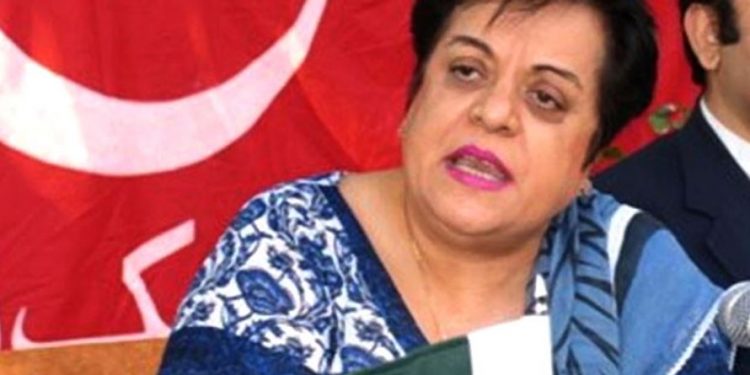Islamabad: Pakistan Human Rights Minister Shireen Mazari has written a detailed letter to 18 UN Special Rapporteurs alleging massive human rights violations by India in Jammu and Kashmir, after it revoked its special status, which she termed as “an annexation by force and therefore an illegal act.”
In a seven-page letter, Mazari said an Indian Cultural Forum went on a fact-finding mission to Jammu and Kashmir between August 9-13, and highlighted serious shortages of medicine and other basic necessities there after the August 5 lockdown.
The team also highlighted incidences of targetting of civilians with pellet guns, and cited the case of a Rising Kashmir graphic designer who reportedly received 172 pellet injuries.
The Pakistani minister cited several specific cases of “gender-based violence as a weapon of war”. Mazari mentioned a video that surfaced of BJP MLA Vikram Saini August 6, in which he was shown as saying that Muslim party workers should “rejoice” at revoking of Kashmir’s special status as “now they can marry the white-skinned women of Kashmir.”
The letter also mentions Haryana CM Manohar Lal Khattar saying August 10 that with Kashmir now open, “brides will be brought from there to here”. He clarified that it was a “joke”. She also listed how Google has experienced a surge in searches on “how to marry a Kashmiri woman.”
Mazari drew a parallel with earlier reports by UN rapporteurs alleging gender-based violations against Dalit women and girls in India, and said: “What should be of particular concern is the capacity for increased threats of gender-based violence against Kashmiri women, taking into consideration the impunity for large-scale violations of this nature” against Dalit women.
She cited the shutdown of telecom facilities in Jammu and Kashmir since August 5, and termed it the “blackout” as a “collective punishment of the people of Jammu and Kashmir without even a pretext of a precipitating offence.”
She attacked the curfew imposed since August 4 night on Jammu and Kashmir, saying it was a violation of the right to religious freedom of Muslims.
She also attacked the arbitrary arrests and detentions, including arrests of political leaders, citing former CM Mehbooba Mufti who termed the revocation of special status “as the darkest day in Indian democracy”.
Mazari alleged that at least 2,300 people have been detained in AKashmir. Mazari termed the revocation of Article 370 and 35A that gave special status to Kashmir as “infringing on the freedom of thought, conscience and religion of the Kashmiri people” and that the restrictions prevented the people from celebrating Eid by congregating for prayers.
She cited reports alleging “violent repression of peaceful protests after Friday prayers in Srinagar prior to Eid prayers” and videos “showing excessive use of force by Indian security forces, which fired live bullets at protesters en masse in their attempt at crowd control and dispersal.”
“These and other acts of violence have even been acknowledged by mainstream politicians, such as the leader of the Congress party, Mr Rahul Gandhi who has noted “people dying” in Jammu and Kashmir, in light of events “going very wrong there.”
Mazari alleged the Indian security forces have been arresting minor children and also denying them the right to go to school due to the lockdown and that children have been the target of pellet guns.
“While the violations discussed above represent only a fraction of the total horrifying violations being committed by the state of India against the Kashmiri people, they are an apt illustration of the intensity of the conflict and gravity of rights violations currently going on in the region.
“Recently Mr Rahul Gandhi, president of the Congress party, and several other Indian opposition leaders, were forcibly returned from Srinagar airport to New Delhi. This further nullifies claims by the Indian government that the situation is “normal”.
She requested the UN Special Procedures Mechanisms to intervene with the Indian government, to reverse its “illegal annexation of Jammu and Kashmir”; end the communications shutdown, ensure compliance with international human rights obligations, among other suggestions.






































